While Sam Childers travels around North America promoting Machine Gun Preacher, a movie opening tomorrow based on his life story, the orphanage he founded in South Sudan is under fire from the community and local government for alleged neglect of the nearly 150 children who live there.
Witnesses have said that the children at Shekinah Fellowship Children's Village are malnourished, unhealthy, and unhappy. Several locals—including pastors, government officials, and a high-ranking member of the military—tell Christianity Today that Childers has exaggerated or outright lied about his work in the African nation.
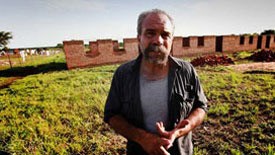
Childers outside at the Shekinah Fellowship Children's Village.
Community leaders want his orphanage in Nimule—near the border with Uganda—to be shut down immediately, and for local ministries to take over. In a September 2 letter to Childers, 14 local leaders—including the man who says he gave 40 acres of land to Childers to build the orphanage—wrote that Chiders has "dishonored our agreement" to take care of orphans, and that they demand "immediate closure of the compound." Childers told CT he never received that letter.
"As a community, we want Sam to leave and let other people take over," said Festo Fuli Akim, the man who says he gave Childers the land in 1999. "Let Sam go away so that someone with a good heart, someone who is humane, can come in and take over."
When a CT reporter visited the orphanage this week, Childers's staff, including two American men, were still on the premises, saying that the only problems at the facility were minor and had been taken care of. CT observed no significant problems; the children seemed happy and healthy, and living conditions seemed generally good.
Childers, in the U.S. to promote the film, denies breaking any laws, or mistreating or neglecting children. He told CT, "We're still there. We're not going anywhere. And I'm not going to let anyone just come in and take my orphanage over."
Former biker finds God
The 49-year-old Childers is a former biker and gang member who found God as a young man and felt called to help orphans in Sudan, where he has been working off and on for more than a decade. Machine Gun Preacher, starring Gerard Butler in the lead role, has received positive buzz at screenings and film festivals, but CT has learned that some of its depictions—as well as some of Childers's claims in his 2009 autobiography—are untrue.
Childers is known as the "Machine Gun Preacher" because he says he fights, often with an AK-47 assault rifle, against the infamous guerrilla leader Joseph Kony and the rogue Lord's Resistance Army (LRA), whose war crimes have left thousands of African children orphaned. In his 2009 book, Another Man's War: The True Story of One Man's Battle to Save Children in the Sudan (Thomas Nelson), Childers writes that he has "rescued more than 900 refugees of all ages. More than half of them were children who had been captured by the Lord's Resistance Army." He founded a group called Angels of East Africa, and he writes of "leading a rescue with an AK in my hands and a pistol on each hip." He claims to have fought alongside the Sudan People's Liberation Army (SPLA) to liberate many of these children—and the movie depicts as much.
But an officer in the SPLA denies any association with Childers, and has asked Childers to stop "staining our names." According to a letter obtained by CT dated April 8, 2011, Lieutenant General Obuto Mamur Mete told Childers that he had become "a problem," and urged him to stop "using the names of our authorities, me in particular, to manipulate your wrongdoings." Mete also told London's Daily Mail that Childers's "claims to have fought alongside us are a lie. He has never even seen the LRA." Childers disputes Mete's claims, saying that he has fought with the SPLA and against the LRA.
Meanwhile, a government inspector in Nimule confirmed this week what community leaders have told CT: Childers is rarely on the premises and many of the children are living in poor conditions, lacking food, medicine, and proper hygiene. Alphonse Irenge Lesur, the senior local government inspector in Nimule, said that he wrote Childers this summer requesting a meeting to investigate those concerns, but that Childers "ignored" the letter and did not show up for the meeting.
Lesure said that government officials inspected the orphanage on July 9, 2011, and found:
- a depleted food supply; there was just one bag of posho (cornmeal) in the kitchen. A cook on the premises confirmed that the orphanage had run out of food,
- a depleted medicine supply,
- shelters in poor condition, some on the verge of collapsing,
- beds with torn mosquito nets, and
- bats and bed bugs on the walls
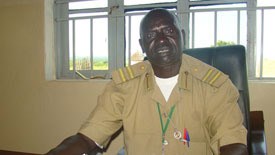
South Sudanese government inspector Alphonse Lesur says officials have found problems at Childers's orphanage.
When CT visited the orphanage this week, we observed five bags of beans, six bags of posho, plus an ample supply of cooking oil, onions, and salt—enough food to last more than a week.
'Beyond shocked' by conditions
Matthew H. Wilson, an American doctor who visited the orphanage in July 2009 said he was "quite angry" at what he witnessed, saying the children were "much sicker than any we had seen" elsewhere in Sudan. Wilson, an assistant professor at Baylor's College of Medicine who takes frequent missions trips to Sudan, wrote in a 2009 e-mail that "many [children] had pus draining out of their ears from ruptured ear drums and infections. Most had swollen bellies from malnutrition." A nurse who was on the trip with Wilson wrote that she was "beyond shocked by the conditions. We saw one child after another with fever over 100 degrees Fahrenheit, ruptured eardrums, fungus-infected heads, protruding bellies, and infected lacerations. … I am at a loss for words as to the suffering of these children."
Wilson said no adults—including Childers—were at the orphanage when his team visited in 2009, but that they left medicine and antibiotics with clear instructions how to administer them. But when they returned two days later, none of the medicine had been given to the children.
"I don't know what to do," Wilson said, "but I have to do something." He ended up asking CT to investigate, and several people we spoke with recently confirmed what Wilson and the nurse observed.
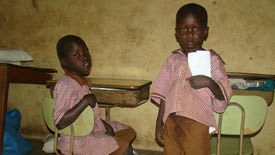
Young boys at the Nimule orphanage.
Childers denied Wilson's charges, saying that a friend who was at the orphanage just two weeks later in 2009 said the children appeared healthy and happy. But Wilson sent CT photographs his team took at the time, including images of beds with no mosquito nets; children with swollen bellies (which Wilson said indicate "malnourishment or worms or both"); an empty kitchen ("We couldn't find food anywhere"); and the tops of children's heads, indicating fungal infections on their scalps ("The only way one gets this is if you are not bathing at all and live in filth. I saw more of this at the orphanage than in the village kids.").
Members of the local community say things haven't changed much since.
"The children are really suffering," said John Okumu, South Sudan regional coordinator for the Africa Inland Church (AIC). Okumu signed what he calls a "partnership agreement" with Childers in 2002 to open the orphanage; he now says Childers has violated the terms of that pact. "Sam Childers has aborted his mission about caring for the children. Instead of taking care of the orphans, he was saying that he was fighting the LRA and rescuing kidnapped children from the LRA. But that is false."
Okumu and others said they witnessed Childers staging photographs of himself fighting against the LRA in order to make his story sound more compelling and to attract more donors to his ministry. Okumu said Childers used guards and children from the orphanage to stage the photos nearby. "He claimed to be rescuing kidnapped children from the LRA," Okumu said. "But it was false. He just took pictures of the children in the bush around the compound here."
"Sam is not fit to continue to do the orphanage ministry," Okumu continued. "I don't want him to be around. I want him to leave Sudan peacefully. If he won't leave, we will ask the authorities to take him." In a letter to the local government dated July 12, 2011, Okumu suggested that the AIC would be glad to take over control of the orphanage. Childers doesn't doubt it: "Imagine how they would feel to just walk in and be able to take the whole thing over. But nothing like that is going to end up happening."
Possible corruption
Childers said that many of the allegations can be traced back to one man—Joseph Shillingi, a Sudanese man Childers hired in 2001 to manage the orphanage. Childers speaks positively of Shillingi in his book, but says he had to fire him several months ago for corruption, stealing money, and impregnating one of the cooks at the orphanage. Childers claims that after he was fired, a distraught Shillingi started telling lies in the community about conditions at the orphanage.
Shillingi said conditions at the orphanage have been poor "since the beginning." In July, he said there had been no food at the orphanage for an entire week. He said he had "borrowed" food from local vendors to feed the children, but that when he asked Childers for money to pay for food, medicine, and supplies, Childers refused.
Childers admitted that there may have been food shortages early this summer, but blames Shillingi, saying the manager had stolen money that was intended for buying the food. "What you've got to realize," Childers said, "is that when I'm not there and I send them money, I can't control what he does with it." Childers said that food has been delivered to the orphanage every two weeks since it opened, and that there were no problems until this year—problems he again blames on Shillingi.
Since dismissing Shillingi, Childers says he is now seeking another Sudanese man to manage the facility full-time. In the meantime, Childers has asked a local pastor, Rev. Ransey Vule, a friend from Kenya, to act as compound manager. Shillingi, meanwhile, says he is considering legal action against Childers for the dismissal.
Meanwhile, Akim, the community leader who says he gave Childers the land 12 years ago, says he has been disappointed in how the land has been used. "The dream for which Sam opened this orphanage has not been achieved," and again urged Childers to return the land to the community. But Childers says that the land was not a gift, that he in fact purchased the land from Akim: "I have a paper that will stand up in any court that shows where I bought the land. I own the ground there." When CT asked to see the document, Childers said, "I'm not going to give that to you. I don't believe that's any of your concern."
Childers, reached Wednesday night in Los Angeles just before attending a screening of Machine Gun Preacher, alleged Akim has also stolen money from him. Childers said he gave Akim almost $19,000 to build a school at the orphanage, but that Akim only used part of the money for the project, which is now "at a standstill," according to Childers. He also claims that Akim used some of the money for himself, and that he will no longer send money to Akim for projects at the orphanage.
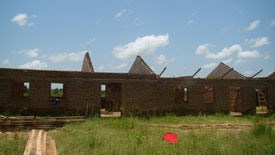
Plans to build a school at the orphanage are on hold.
Childers said that long ago he had agreed to give the community $30,000 for building the school, and that when he gives them the balance—about $11,000—he will not give it to Akim, but to other community leaders. "And I will give it to them in front of someone from the government, so they can see [the transaction]," he said. "So if they don't finish the school, it has nothing to do with us." Childers said he would give the community the remaining money as soon as he returns in early October.
When asked why he would want to remain in a community where so many people are angry at him and want him to leave, Childers downplayed the issue.
"I kind of disagree on that," he said. "You might hear that from some people, but what about all the other ones who aren't saying that. Hear me out: I'm not going to try to convince you that I have just as many people wanting me there, just because there's a handful saying no. I guarantee, all of these accusations go back to Joseph Shillingo or Festo Akim. But I have way more people wanting me there than what you're talking about. That's all I can say.
"I've been in Sudan going on 15 years. I have a lot of friends there. I'm not going to say there's no problems in our ministry, but I can't control what goes on there when I'm not there. But we have taken every precaution that we could to correct anything that was going on, even the things that were out of our hands. But when I go back, I'm going to sit down with the community leaders and try to get them all happy."
'Genuinely cares for people'
Childers is not without his defenders.
Rafael Padro, a pastor from the U.S. and a longtime friend of Childers, is watching over the orphanage while Childers is away. "I want the whole world to know that this orphanage is a very, very special place," Padro said. "And that's all because of Sam Childers."
Butler, the Scottish actor who plays Childers in Machine Gun Preacher, said in one interview that he appreciates the Childers who, after finding God, "found this higher purpose, first in God and then in this mission." Butler spent "quite a lot" of time with Childers before the film was shot, and says he's "such an incredible guy. It was big boots to fill, but it was a joy to do." In an interview with the Los Angeles Times, Butler cried for a full two minutes while discussing how Childers's story had moved him.
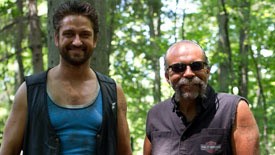
Actor Gerard Butler (left) plays Childers in Machine Gun Preacher, which opens tomorrow.
Deborah Giarratana, a producer of Machine Gun Preacher, has known Childers for years and has even visited the orphanage in Nimule. She said she saw no problems at the facility, but added that she knows that the sometimes gruff Childers can rub people the wrong way.
"Sam is not perfect by any means," Giarratana said. "In fact, he's quite tough and even difficult sometimes. But underneath that cowboy tough-guy skin is a broken man who genuinely cares for people. I've seen it with my own eyes.
"How can a man risk his life to rescue kids and then later mistreat them by not feeding them or taking care of them. Yes, his methods are unconventional, almost controversial, but you can't deny how much he cares for children. So maybe he might need more administrative help at the orphanage, but overall he does his best."
9/23 UPDATE: CT has obtained a second letter from an SPLA official denying that Childers works with them. "Sam Childers is not associated with the SPLA," Lt. Gen. Kuol Deim Kuol said in a statement. "The SPLA does not know Sam Childers."
With additional reporting by Uma Julius and Esther Nakkazi in South Sudan.
Copyright © 2011 Christianity Today. Click for reprint information.
Related Elsewhere:
The Christianity Today Entertainment blog has been following the Machine Gun Preacher movie development. (Our review of the film will post here on Sept. 23.)
Vanity Fair and the St. Louis Post-Dispatch profiled Childers last year.
Childers's Angels of East Africa site (archive) now redirects to MachineGunPreacher.org.
Childers's book, Another Man's War, is available from ChristianBook.com and other book retailers.

Support Our Work
Subscribe to CT for less than $4.25/month




















